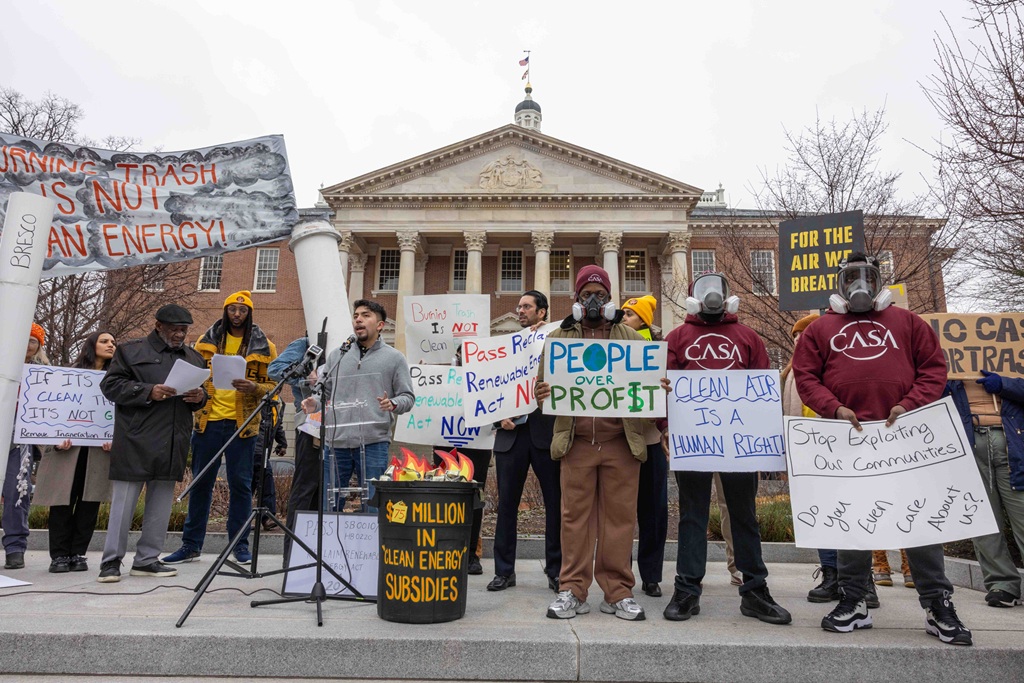
On Monday, Maryland ended its 90-day legislative session. With uncertainty out of Washington, this was a difficult year in Annapolis. Legislators grappled with a deficit that became worse as the state faced questions about federal grants and jobs.
Against these difficult headwinds, we worked with our coalition partners to deliver some victories - and have much more work to do.
✅Reclaim Renewable Energy Act (HB220/SB10): Passed! After nearly a decade of campaigning with frontline communities fighting trash incinerators in Maryland, the General Assembly has finally deleted trash incineration from Maryland’s Renewable Portfolio Standard. This ends Maryland’s practice of greenwashing trash incineration and subsidizing incinerator companies millions of dollars per year, redirecting that money toward renewable energy instead. The General Assembly amended the text of the Reclaim Renewable Energy Act into the Next Generation Energy Act (HB1035/SB937), which is now on the governor’s desk. Read more in the Baltimore Brew.
❌ Septic System Safety (HB747): The House of Delegates passed this bill to require that septic systems be inspected when a home is sold or rented. This common sense requirement, which is already required by most mortgage lenders, would make sure that homes have functioning systems and will allow failing systems to be discovered and repaired before catastrophic failure, protecting drinking water and local streams. The Senate worked to pass the bill to almost the last minute, until a new amendment offered fifteen minutes before midnight on Monday doomed it for this year. We will work on this bill again next year and are grateful to Delegate Guyton’s leadership in spearheading this issue.
❌ CHERISH Our Communities Act (HB1484/SB978): This community-led environmental justice bill would have filled a huge gap in Maryland’s system of controlling pollution by ensuring that Maryland address the cumulative impacts of concentrated pollution on communities’ health. Unfortunately, in the face of amendments that would have exempted some of the biggest polluters in Baltimore, the community-led coalition had to decide not to move the bill forward this year. We will keep working for environmental justice and for a strong CHERISH Our Communities Act in 2026. Read more in Maryland Matters.
❌ Food Waste Reduction and Diversion Grants (HB42/SB134): This bill would have funded food waste reduction and diversion programs throughout the state. As originally written by our coalition, these would have been independently funded through a $2/ton surcharge on waste hauled to a landfill or incinerator, but as amended by the House, the bill would have funded the grant programs through a discretionary appropriation from Maryland’s Strategic Energy Investment Fund instead. Despite strong support for the bill and no opposition in its final days, the Senate never brought the bill up for a vote.
❌ Bottle Bill (HB232/SB346): Otherwise known as the Maryland Beverage Container Recycling Refund and Litter Reduction Program, this great Zero Waste bill will set up a deposit-based system for collecting beverage containers to reduce litter and increase recycling. This bill passed the House Environment and Transportation Committee but stalled in the House Economic Matters Committee.
🚫 PFAS in Pesticides (HB386/SB345): Blocked. We originally supported this bill which would have phased out the use of pesticides containing PFAS, a class of chemicals linked to a wide variety of health issues. Originally, the bill referenced the definition of PFAS already written in MD law and would have ensured strong protections—but the House of Delegates adopted a terrible industry-backed amendment that weakened the definition of PFAS and set an awful precedent. After our coalition worked to oppose this dangerously amended bill, the Senate never brought it to a vote, effectively stopping it. Read more in Maryland Matters.
Thank you to everyone who called their legislators and set emails supporting our legislative priorities and other important bills in Annapolis. Legislators have a lot of competing demands for their attentions during Maryland’s whirlwind 90-day Session, so your continued advocacy demonstrates the broad support for cleaner water across the state. We’ll be in touch about next steps for local and state actions in Maryland for clean water, clean air, and healthy communities!


